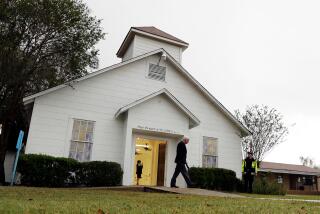Soweto Church Worships on Fringe of the Law
- Share via
SOWETO, South Africa — She was dressed for the occasion in a black suit with an emerald green blouse and a jaunty black Spanish sombrero. In the modest Anglican church, she cut a dashing figure. Heads turned. People nodded in recognition of the best-known inhabitant of this township south of Johannesburg.
The minister, the Rev. David Nkwe, addressed Winnie Mandela, wife of imprisoned African National Congress leader Nelson Mandela, as “the mother of the nation,” recounted her recent difficulties and asked her to stand and receive the acknowledgments of the congregation.
It is skirting the fringes of the state of emergency rules restricting press coverage to report that as she did this, she raised her fist in the black nationalist salute and thus drew cries of “Amandla!”--the evocative chant of activists that means power to the blacks.
Under the government’s newly expired emergency regulations, that display might have disqualified the gathering as a legitimate church service, with everyone there made subject to instant arrest, as has happened several times to church congregations over the last week.
In a slight amendment to the strict press regulations Saturday, the government said it was permissible for reporters to enter black areas, provided it was not for the purpose of reporting on any matters relating to civil unrest, security force activities or anything to do with the emergency action, which has resulted in 54 known deaths and an estimated 3,000 detentions of blacks.
A lawyer, consulted by a reporter, also advised that it would be within the law to attend a church where Mandela worships, provided that the reporter did not speak to her about unrest or police action while in Soweto. If the reporter wanted to ask her about that, he would either have to accompany her outside Soweto or speak to her later by telephone.
Mandela has been subjected to special restrictions as well. Her small red-brick house on Vilakazi Street here was surrounded last Monday night, and she was served with a partial house-arrest order that also prohibited her from communicating with any member of the news media for the rest of the week. But now it was Sunday, and that restriction, too, had expired.
Following the lawyer’s advice, the reporter delayed his conversation with Mandela until later. “It was an indescribable week,” she said. “We were under total occupation. There were armed men everywhere, like what I imagine Beirut looks like. There was a lot of shooting and a lot of tear gas in my area, but mercifully not as many deaths as I feared there would be.”
What now?
“I am sure we are heading for worse times,” she said. “Tough action like this is not the solution. It has failed in the past, which is why 10 years after the Soweto uprising the government is still passing more stringent security laws. The statute books are already bursting, but still they need more laws. All it does is sow the seeds for more strife.”
More to Read
Sign up for Essential California
The most important California stories and recommendations in your inbox every morning.
You may occasionally receive promotional content from the Los Angeles Times.













